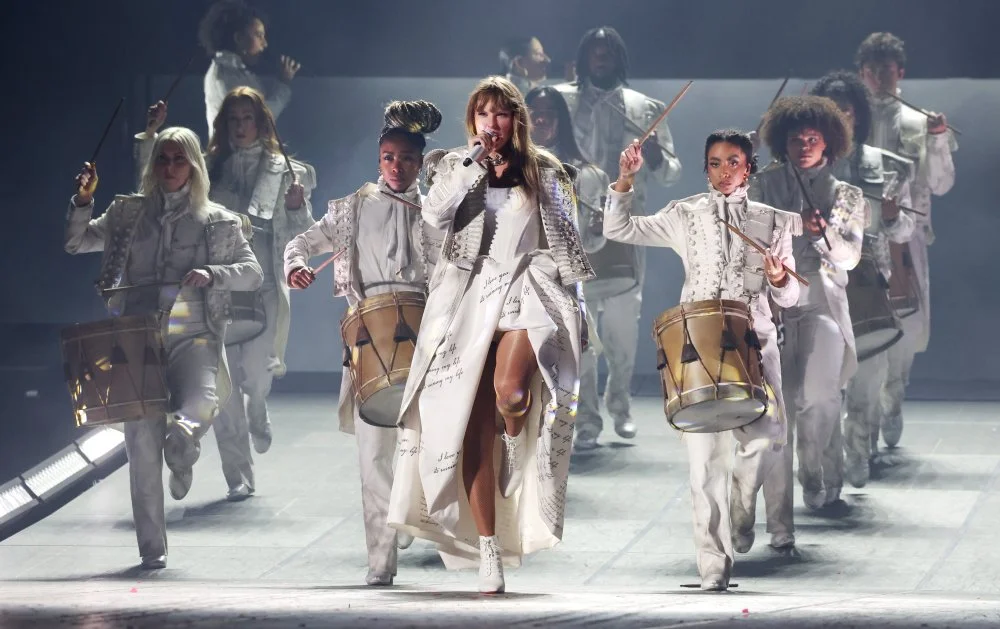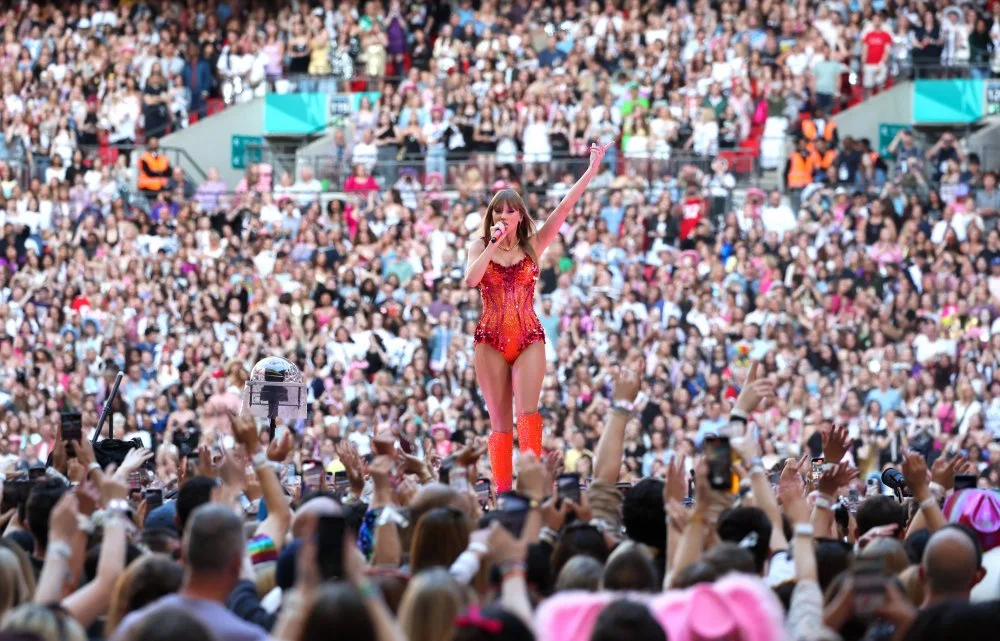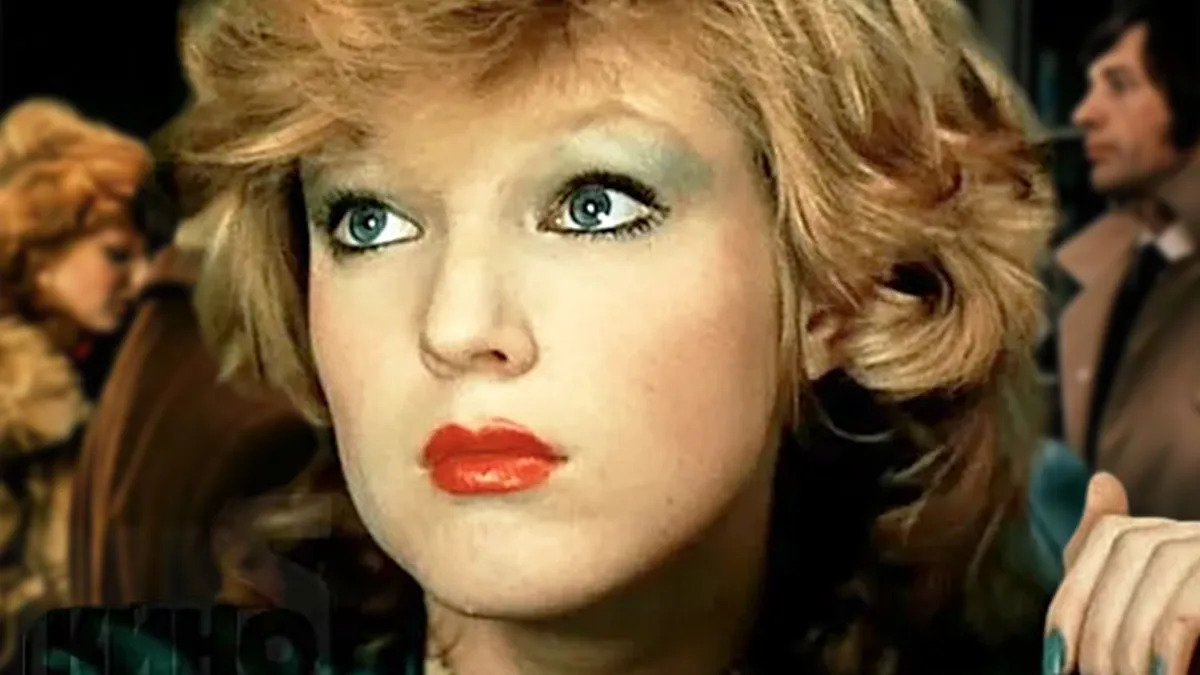
Taylor Swift performs on stage during «Taylor Swift | The Eras Tour» at Wembley Stadium on June 23, 2024 in London, England/Gareth Cattermole/TAS24/Getty Images
Since the beginning of language and human society, words have had the power to shape our world. To explore the reaches of this ability, each month, Qalam dives into a new word that unlocks a deeper understanding of our lives. The word this month is ‘Swiftquake’.
This phenomenon was already observed at Taylor Swift's concerts in the summer of 2023 in Seattle, but the term ‘Swiftquake’ seems to have finally taken hold in common usage after her Scottish tour in June 2024. In Edinburgh, during her performances, people went into such a frenzy that the British Geological Survey recorded increased seismic activity on several occasions. This was possibly also due to the fact that tickets for her ‘The Eras Tour’ in Europe were much cheaper than in the US due to mark-up limits, and the influx of American fans on the Continent expressed their emotions with double the intensity.
Contemporary vocabulary has already significantly Swift-ified itself—it includes words like ‘Swiftie’, ‘Swiftonomics’, ‘Swiftomania’, and ‘Tay-conomy’. This month, another term appeared: ‘Taylor Town’, which came after a special installation was unveiled at the Royal Albert Dock in Liverpool (the hometown of the Beatles) in honor of her tour. There was also a university symposium called Tay Day, dedicated to the artist's cultural phenomenon.

Taylor Swift performs onstage during «Taylor Swift | The Eras Tour» at La Defense on May 09, 2024 in Paris, France/Kevin Mazur/TAS24/Getty Images
But the term ‘Swiftquake’ is successful because it highlights the nature of what is happening. Swift's immense success seems to belong to the realm of chaos theory: just as a butterfly flapping its wings can cause a hurricane on the other side of the world (and there is a song about a hurricane named after her on Swift’s latest album), the public's reaction to her music closely resembles deterministic-chaotic systems that are sensitive to minor influences.
Her gigantomania and drive to fill every space is also something out of the realm of physics. She herself is a tall person, standing at 5’11” (180 cm), with concerts that last over three hours (a factor that intimidated her young competitor Billie Eilish), and she releases albums in stacks: one comes out today, and another one tomorrow with fifteen new songs added, et cetera. Once, after a dispute with her label over rights, she simply re-recorded all six of her albums and sold them again. No one even discusses how much Taylor Swift personally earns anymore—now it's about macroeconomic indicators and her direct impact on the GDP of the US and other countries. It seems that she has indeed cracked the infinity symbol.

Taylor Swift performs onstage during «Taylor Swift | The Eras Tour» at La Defense on May 09, 2024 in Paris, France/Kevin Mazur/TAS24/Getty Images
If you listen to Swift’s latest album, it's full of butterfly wing flaps: songs about heartbreak, cosmic love, and emotional abuse, those small influences that, for some reason, can prompt millions of people to spend a billion dollars (and the Eras Tour's revenues have approached that figure). Swift plays quite interestingly with styles and musical choices, and so even if you're not a fan, it's easy to acknowledge that a composition like ‘So Long, London’ is good, and the line ‘And my friends all smell like weed or little babies’ is good, and the songs increasingly feature expletives, and the situations described in them are quite relatable: ‘And your cheating husband disappeared’ and ‘Barricaded in the bathroom with a bottle of wine’.
This music offers a wealth of discoveries for those willing to explore it deeply. However, it fails to address one crucial question: how did this particular style become so popular? What led to this exception becoming the rule, transforming the average into something of astronomical proportions, akin to a googolplex?1

Taylor Swift performs on stage during «Taylor Swift | The Eras Tour» at Wembley Stadium on June 23, 2024 in London, England/Gareth Cattermole/TAS24/Getty Images for TAS Rights Management
One might speculate that Swift represents a new, dynamic virtue that everyone presumably missed. For example, her longtime adversary Kanye West, also a person with significant claims to world domination in terms of popularity, works according to the old enfant terrible trope, holding all the seedy trump cards: Hitler, pornography, narcissism laced with a hint of wild insanity, et cetera.
In contrast, Swift embodies the essence of a natural luminary and a vanquisher of personal demons. Despite this, she's faced allegations of Satanism and Illuminati affiliation.2

Taylor Swift performs on stage during «Taylor Swift | The Eras Tour» at Wembley Stadium on June 22, 2024 in London, England/Kevin Mazur/Getty Images for TAS Rights Management
Conspiracy or not, it seems the old world is betting on her as an allegory of traditional values (race plays a significant role here as does her Christian upbringing). Of course, she can't be placed in the conservative camp: the founder of Swiftonomics confidently navigates a liberal agenda, supporting all the necessary causes, whether it's the right to abortion, Black Lives Matter, or individualism as a norm of life. However, on a more global civilizational level, she still symbolizes a highly tuned and emancipated but archaic form—after all, it's not a coincidence that she originally emerged from the country music world, and her music breathes with the entrenched power of the trivial. Compared to her, Billie Eilish is a complete alt-girl in today's language. But Eilish is a typical diva, and, for example, Beyoncé is a classic prima donna. Swift, on the other hand, is already a unifying force. It's easy to imagine her as a warrior in the upcoming battle of humanity against artificial intelligence and other vestiges of post-humanism.
For instance, when she performs in Paris in a scarlet corset reminiscent of Parisian cabarets, if not brothels, it's again a reference to deeply traditional sexual stereotypes. In general, the sexuality of Swift's stage persona seems to be a transgenerational phenomenon. She, like a long-term savings program, resonates with different generations, including both Boomers and Zoomers. For example, The Guardian recently published a piece about a mother and daughter attending her show together, shedding tears of joy. Swift has an appearance that is easy to imagine in a gallery of ’70s folk, on the New York disco scene of the ’80s, or even at a socialist music contest in Sopot. She, in particular, resembles the actress Elena Denisova, whom the older generation might remember from the Soviet TV comedy set in French life Cherchez la Femme (1982), where she played a highly seductive secretary.

Actress Elena Denisova in the film «Look for a woman» in 1982/from open sources
By placing matters of the heart, emotional traumas, and other aspects of private life at the center of everything, Taylor Swift manifests what British historian Niall Ferguson in 2019 called ‘emocracy’: ‘We no longer live in a democracy. We live in an emocracy—where emotions rather than majorities rule, and feelings matter more than reason.’ But this excess of emotions also requires a leader to manage it, and Taylor Swift has risen to this role, fully realizing the old feminist slogan ‘the personal is political’.